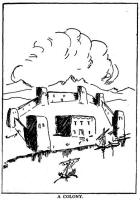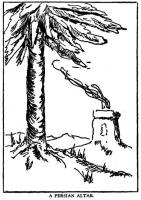|
THE END OF THE ANCIENT WORLD
So far, the story of ancient man has been the record of a
wonderful achievement. Along the banks of the river Nile, in
Mesopotamia and on the shores of the Mediterranean, people had
accomplished great things and wise rulers had performed mighty
deeds. There, for the first time in history, man had ceased to be a
roving animal. He had built himself houses and villages and vast
cities.
He had formed states.
He had learned the art of constructing and navigating
swift-sailing boats.
He had explored the heavens and within his own soul he had
discovered certain great moral laws which made him akin to the
divinities which he worshipped. He had laid the foundations for all
our further knowledge and our science and our art and those things
that tend to make life sublime beyond the mere grubbing for food and
lodging.
Most important of all he had devised a system of recording sound
which gave unto his children and unto his children's children the
benefit of their ancestors' experience and allowed them to
accumulate such a store of information that they could make
themselves the masters of the forces of nature.
But together with these many virtues, ancient man had one great
failing.
He was too much a slave of tradition.
He did not ask enough questions.
He reasoned "My father did such and such a thing before me and my
grandfather did it before my father and they both fared well and
therefore this thing ought to be good for me too and I must not
change it." He forgot that this patient acceptance of facts would
never have lifted us above the common herd of animals.
Once upon a time there must have been a man of genius who refused
any longer to swing from tree to tree with the help of his long,
curly tail (as all his people had done before him) and who began to
walk on his feet.
But ancient man had lost sight of this fact and continued to use
the wooden plow of his earliest ancestors and continued to believe
in the same gods that had been worshipped ten thousand years before
and taught his children to do likewise.
Instead of going forward he stood still and this was fatal.
For a new and more energetic race appeared upon the horizon and
the ancient world was doomed.
We call these new people the Indo-Europeans. They were white men
like you and me, and they spoke a language which was the common
ancestor of all our European languages with the exception of
Hungarian, Finnish and the Basque of Northern Spain.
When we first hear of them they had for many centuries made their
home along the banks of the Caspian Sea. But one day (for reasons
which are totally unknown to us) they packed their belongings on the
backs of the horses which they had trained and they gathered their
cows and dogs and goats and began to wander in search of distant
happiness and food. Some of them moved into the mountains of central
Asia and for a long time they lived amidst the peaks of the plateau
of Iran, whence they are called the Iranians or Aryans. Others
slowly followed the setting sun and took possession of the vast
plains of western Europe.

They were almost as uncivilized as those prehistoric men who made
their appearance within the first pages of this book. But they were
a hardy race and good fighters and without difficulty they seem to
have occupied the hunting grounds and the pastures of the men of the
stone age.
They were as yet quite ignorant but thanks to a happy Fate they
were curious. The wisdom of the ancient world, which was carried to
them by the traders of the Mediterranean, they very soon made their
own.
But the age-old learning of Egypt and Babylonia and Chaldea they
merely used as a stepping-stone to something higher and better. For
"tradition," as such, meant nothing to them and they considered that
the Universe was theirs to explore and to exploit as they saw fit
and that it was their duty to submit all experience to the acid test
of human intelligence.
Soon therefore they passed beyond those boundaries which the
ancient world had accepted as impassable barriers--a sort of
spiritual Mountains of the Moon. Then they turned against their
former masters and within a short time a new and vigorous
civilization replaced the out-worn structure of the ancient Asiatic
world.
But of these Indo-Europeans and their adventures I give you a
detailed account in "The Story of Mankind," which tells you about
the Greeks and the Romans and all the other races in the world.
A FEW DATES CONNECTED
WITH THE PEOPLE
OF THE ANCIENT WORLD
I can not give you any positive dates connected with Prehistoric
Man. The early Europeans who appear in the first chapters of this
book began their career about fifty thousand years ago.
THE EGYPTIANS
The earliest civilization in the Nile Valley developed forty
centuries before the birth of Christ.
3400 B.C. The Old Egyptian Empire is founded. Memphis is the
capital.
2800--2700 B.C. The Pyramids are built.
2000 B.C. The Old Empire is destroyed by the Arab shepherds, called
the "Hyksos."
1800 B.C. Thebes delivers Egypt from the Hyksos and becomes the
centerof the New Egyptian Empire.
1350 B.C. King Rameses conquers Eastern Asia.
1300 B.C. The Jews leave Egypt.
1000 B.C. Egypt begins to decline.
700 B.C. Egypt becomes an Assyrian province.
650 B.C. Egypt regains her independence and a new State is founded
with Sais in the Delta as its capital. Foreigners, especially
Greeks, begin to dominate the country.
525 B.C. Egypt becomes a Persian province.
300 B.C. Egypt becomes an independent Kingdom ruled by one of
Alexander the Great's generals, called Ptolemy.
30 B.C. Cleopatra, the last princess of the Ptolemy dynasty, kills
herself and Egypt becomes part of the Roman Empire.
THE JEWS
2000 B.C. Abraham moves away from the land of Ur in eastern
Babylonia and looks for a new home in the western part of Asia.
1550 B.C. The Jews occupy the land of Goshen in Egypt.
1300 B.C. Moses leads the Jews out of Egypt and gives them the Law.
1250 B.C. The Jews have crossed the river Jordan and have occupied
Palestine.
1055 B.C. Saul is King of the Jews.
1025 B.C. David is King of a powerful Jewish state.
1000 B.C. Solomon builds the Great Temple of Jerusalem.
950 B.C. The Jewish state divided into two Kingdoms, that of Judah
and that of Israel.
900-600 B.C. The age of the great Prophets.
722 B.C. The Assyrians conquer Palestine.
586 B.C. Nebuchadnezzar conquers Palestine. The Babylonian
captivity.
537 B.C. Cyrus, King of the Persians, allows the Jews to return to
Palestine.
167-130 B.C. Last period of Jewish independence under the Maccabees.
63 B.C. Pompeius makes Palestine part of the Roman Empire.
40 B.C. Herod King of the Jews.
70 A.D. The Emperor Titus destroys Jerusalem.
MESOPOTAMIA
4000 B.C. The Sumerians take possession of the land between the
Tigris and the Euphrates.
2200 B.C. Hammurapi, King of Babylon, gives his people a famous code
of law.
1900 B.C. Beginning of the Assyrian State, with Nineveh as its
capital.
950-650 B.C. Assyria becomes the master of western Asia.
700 B.C. Sargon, the ruler of the Assyrians, conquers Palestine,
Egypt and Arabia.
640 B.C. The Medes revolt against the Assyrian rule.
530 B.C. The Scythians attack Assyria. There are revolutions all
over the Kingdom.
608 B.C. Nineveh is destroyed. Assyria disappears from the map.
608-538 B.C. The Chaldeans reestablish the Babylonian Kingdom.
604-561 B.C. Nebuchadnezzar destroys Jerusalem, takes Phoenicia and
makes Babylon the center of civilization.
538 B.C. Mesopotamia becomes a Persian province.
330 B.C. Alexander the Great conquers Mesopotamia.
THE PHOENICIANS
1500-1200 B.C. The city of Sklon is the chief Phoenician center of
trade.
1100-950 B.C. Tyre becomes the commercial center of Phoenicia.
1000-600 B.C. Development of the Phoenician colonial Empire.
850 B.C. Carthage is founded.
586-573 B.C. Siege of Tyre by Nebuchadnezzar. The city is captured
and destroyed.
538 B.C. Phoenicia becomes a Persian province.
60 B.C. Phoenicia becomes part of the Roman Empire.

THE PERSIANS
At an unknown date the Indo-European people began their march into
Europe and into India.
The year 1000 B.C. is usually given for Zarathustra, the great
teacher of the Persians, who gave an excellent moral law.
650-B.C. The Indo-European Medes found
a state along the eastern boundaries
of Babylonia.
550-330 B.C. The Kingdom of the Persians. Beginning of the struggle
between Indo-Europeans and Semites.
525-8.C. Cambyses, King of the Persians, takes Egypt.
520-485 B.C. Rule of Darius, King of the Persians, who conquers
Babylon and attacks Greece.
485-465 B.C. Rule of King Xerxes, who tries to establish himself in
eastern Europe but fails.
330 B.C. The Greek, Alexander the Great, conquers all of western
Asia and Egypt and Persia becomes a Greek Province.
The ancient world which was dominated by Semitic peoples lasted
almost forty centuries. In the fourth century before the birth of
Christ it died of old age.
Western Asia and Egypt had been the teachers of the
Indo-Europeans who had occupied Europe at an unknown date.
In the fourth century before Christ, the Indo-European pupils had
so far surpassed their teachers that they could begin their conquest
of the world.
The famous expedition of Alexander the Great in 330 B.C. made an
end to the civilizations of Egypt and Mesopotamia and established
the supremacy of Greek (that is European) culture. |
